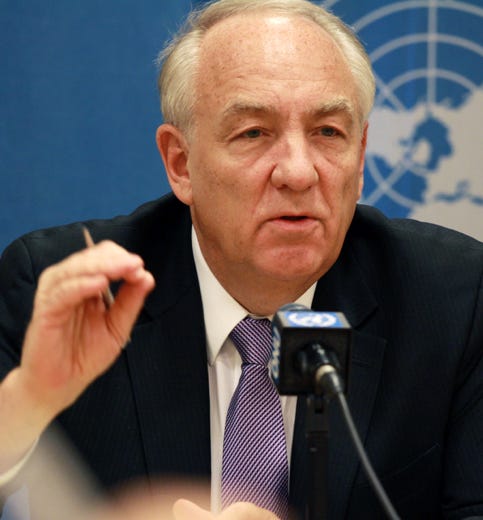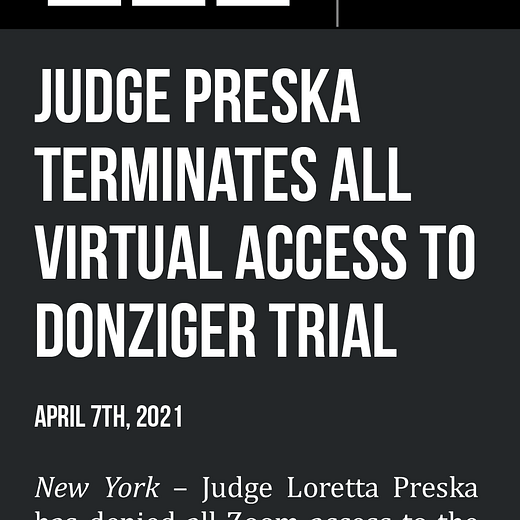Chevron’s political prisoner gets his trial
What you should know about the extraordinary case of Steven Donziger
Emily Sanders is the Center for Climate Integrity’s editorial lead. Catch up with her on Twitter here.
The trial of Steven Donziger, the human rights lawyer whose 600+ day home confinement related to his work against oil giant Chevron has been called a “Kafkaesque nightmare,” begins Monday in New York City.
Donziger spent more than 27 years representing Indigenous peoples and rural farmers of the Ecuadorian Rainforest in a case against Chevron and its predecessor, Texaco, for dumping more than 70 billion liters of toxic waste into the rainforest those defendants call home. The region, now known as the “Amazon Chernobyl,” faces widespread environmental devastation and exceptionally high rates of cancer as a direct result of the oil giant’s actions.
In 2011, an Ecuadorian court ordered Chevron to pay $9.5 billion to help remedy the damage the company caused. But Chevron, not known for taking responsibility for its actions, had something else in mind.
Instead of paying what they owed, Chevron sought to destroy the lawyer who took them on.
“We will fight this until hell freezes over, and then fight it on the ice,” said one Chevron official of the Ecuador judgment. So they did — and demonstrated that Chevron will create hell on earth for anyone who dares stand in their way.
A decade after the Ecuadorian court ruled against Chevron, Donziger has been imprisoned in his home with an ankle bracelet for more than 600 days, his law license and passport have been revoked, and his bank accounts have been frozen. How did we get here?
A brief timeline:
In 2013, Chevron filed a Racketeering Influenced and Corrupt Organizations (RICO) lawsuit against Donziger in New York federal court, arguing that the initial judgment against them was the result of a bribe. Donziger was denied a jury of his peers, and the new case against him was overseen by Judge Lewis Kaplan — a former corporate lawyer who represented tobacco companies.
In 2014, Judge Kaplan ruled that the initial verdict was a result of fraud — largely relying on the testimony of Albert Guerra, a former Ecuadorian judge involved in the initial trial, who Chevron relocated to the United States and coached for almost two months before delivering him as a witness to the court. Guerra later recanted most of his testimony.
Still, Kaplan ordered Donziger to pay millions in attorneys fees to Chevron and demanded his cell phone and computer to review decades of client communications.
When Donziger appealed that order and federal prosecutors refused to bring charges, Judge Kaplan drafted criminal complaint charges against him and then appointed a private law firm to prosecute him. That law firm, Seward & Kissel, had represented Big Oil companies before — including Chevron.
In 2019, the new judge appointed to his trial, a member of the Federalist society, placed Donziger under house arrest.
“Chevron has continued its all-out assault on Donziger …[it] has hired private investigators to track [him], created a publication to smear him, and put together a legal team of hundreds of lawyers from 60 firms, who have successfully pursued an extraordinary campaign against him,” wrote journalist Sharon Lerner for the Intercept.
The stakes for this trial couldn’t be higher.
On Monday, Donziger faces a misdemeanor contempt charge for disobeying court orders that could land him six months in prison. His requests for the trial to be broadcast over Zoom for the sake of transparency have so far been denied.
Donziger’s law license and freedom hang in the balance. But the 30,000 Indigenous defendants in the Amazon are still the center of this case and its outcome.
While Chevron spends its money and time persecuting Donziger, the Amazon Defense Coalition still has not recovered the billions of dollars in damages they were awarded to begin cleaning up the toxic mess Chevron left behind and build treatment centers for the many residents now battling cancer.
The results of Donziger’s trial, which Paul Paz y Miño, the associate director of the environmental group Amazon Watch, described as “the most important corporate accountability case in history,” will also send a message one way or another to corporate polluters across the world. “Whether it’s Chevron or BP or Shell or any other oil company, if you cannot hold them to account and the lawyer advocating for that case is personally attacked, who else is going to fight those kinds of cases?” Paz y Miño said to The Nation.
Last week, six members of the Congressional Progressive Caucus sent a letter to U.S. Attorney General Merrick Garland that asks the Department of Justice to intervene and immediately review Donziger’s case.
“We have deep concerns that the unprecedented nature of Mr. Donziger’s pending legal case is tied to his previous work against Chevron,” the representatives wrote. “We urge you to act quickly to conduct an immediate and full and fair review of the deeply concerning process by which Mr. Donziger’s current case has played out, and the deeply troubling signal it sends to frontline communities in urgent need of legal support.”
Donziger’s case is a window into just how far Big Oil will go to maintain its stranglehold over American democracy, and to ensure that anyone who dares challenge its toxic regime here and across the globe is punished. While this case lingers on, fossil fuel companies are still working to criminalize the protest of fossil fuel infrastructure across the United States — and have managed to get a slew of such bills passed since the start of the COVID-19 pandemic.
Monday’s trial will take place at the New York federal courthouse in Manhattan — and the implications for corporate accountability could not be greater. Zoom access or not, the world will be watching.
ICYMI News Roundup





